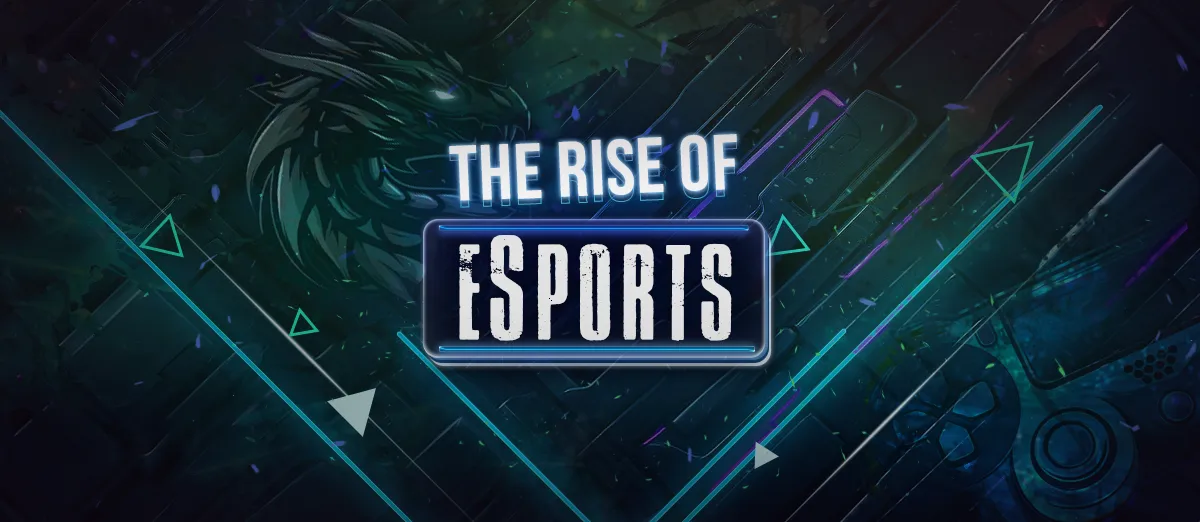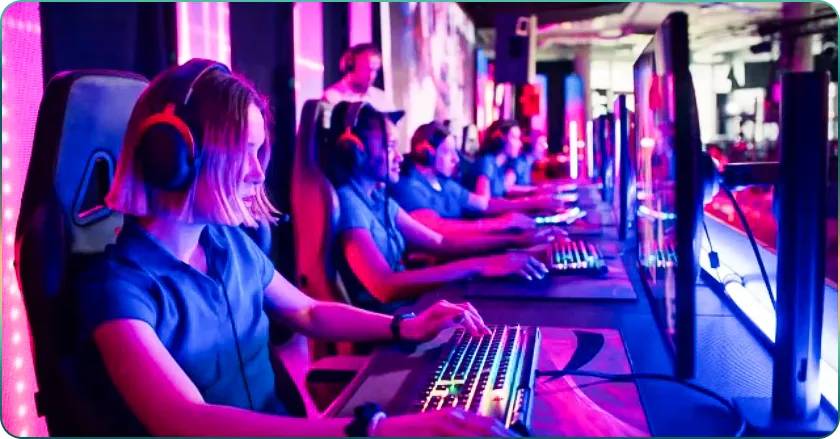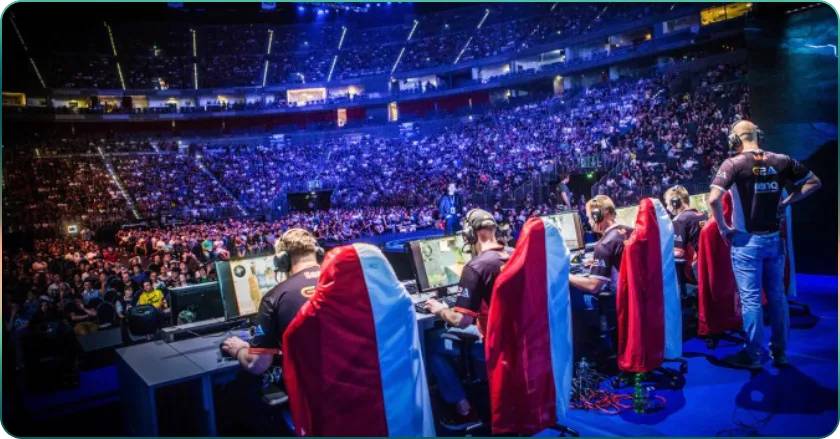The Rise of eSports – From Early Beginnings to Becoming a Global Phenomenon

Electronic sports, also known as eSports, have evolved from an almost micro-niche into a global phenomenon, captivating millions of fans and generating billions of dollars in revenue. Technological advancements, cultural shifts, and the increasing legitimacy of competitive gaming have driven this rapid growth.
Interestingly and perhaps unbeknown to many, the origins of eSports can be traced back to the 1970s and 1980s, when games like Pong and Space Invaders first captivated audiences. The first recorded video game competition, held in 1972 at Stanford University, where students battled it out in Spacewar, marking a significant milestone in the history of eSports. Despite this, it wasn't until the late 1990s and early 2000s that eSports became a structured competitive activity, with games like "StarCraft" and "Counter-Strike" becoming popular among gamers.
Over the years, we have seen considerable advancements in technology, which ultimately underpin the industry. The creation of high-speed internet, advancements in computer graphics, and increased processing power have revolutionized the landscape of eSports. Online multiplayer games have become more accessible, enabling players from around the globe to compete. The emergence of platforms like Twitch, YouTube Gaming, and Mixer has made live streaming a reality, allowing fans to watch their favorite eSports players and tournaments in real time.

The World of eSports - Professional Teams and Major Tournaments
eSports has numerous elements and is categorized into various tiers, from amateur leagues to professional circuits. Professional eSports teams, often backed by major sponsors and investors, compete in events and leagues across multiple games, very similarly to the biggest poker tournaments in the world. These teams are composed of skilled players who dedicate significant time to practice and strategies. Notable teams include Fnatic, Team Liquid, and Cloud9, which have established themselves as dominant forces in the industry.
Another component is eSports tournaments and leagues, which are essentially the backbone of competitive gaming. Significant events like "The International" for "Dota 2," the "League of Legends World Championship," and the "Overwatch League" attract millions of viewers and offer some of the most substantial prize pools in the gaming industry. These events are often held in large arenas, drawing live audiences and enhancing the spectator experience.
Meanwhile, game developers and publishers are the backbone of eSports, as they create and maintain the games that form the foundation of competition. Companies like Riot Games ('League of Legends'), Valve Corporation ('Dota 2' and 'Counter-Strike: Global Offensive'), and Blizzard Entertainment ('Overwatch') actively support the eSports scene through updates, balancing, and official tournament organization.
Key Global Markets and Industry Trends
Over the last few years, the eSports' niche' has grown substantially, and it is understood that revenues are more than $1.5 billion for last year. Various revenue streams, including sponsorships, media rights, advertising, merchandise, and ticket sales, fuel this growth. As such, we have explored the main markets in some detail below.
North America
North America is a major hub for eSports, with the United States leading the charge. Major cities like Los Angeles, New York, and Seattle host numerous eSports events and are home to several top-tier teams. Establishing dedicated eSports arenas, such as the Blizzard Arena in Los Angeles and the HyperX Esports Arena in Las Vegas, underscores the region's commitment to the industry.
Asia
Asia, particularly South Korea, China, and Japan, is the epicentre of eSports. South Korea's dominance in games like "StarCraft" and "League of Legends" has cemented its reputation as a powerhouse in the eSports world. China boasts a massive player base and hosts some of the most significant eSports events, including the annual "League of Legends" tournament. Japan, known for its rich gaming culture, is also making strides in eSports.
Europe
Europe has a thriving eSports scene, with countries like Germany, Sweden, and France leading the way. The region has several prominent teams and hosts major events such as the Intel Extreme Masters and DreamHack. European governments are increasingly recognising eSports, with initiatives to support the industry and foster talent.
Emerging Markets
The LatAm online gambling market is not the only thing booming right now. Emerging markets in Latin America, Southeast Asia, and the Middle East are experiencing rapid growth in eSports interest. Countries like Brazil, India, and the Philippines are witnessing a considerable increase in player participation and viewership. These regions present significant opportunities for investment and development as eSports continue to expand globally.
The Rise of Saudi Arabia's eSports Industry
Over the last 12 months, one market has emerged swiftly as one of the main contenders on the eSports stage. The eSports scene in Saudi Arabia has experienced remarkable growth in recent years, reflecting a broader trend of increasing digital engagement and entertainment within the Kingdom. Significant investments, government support, and a burgeoning community of gamers and fans drive this expansion.
The Saudi Arabian government has been a critical catalyst in the growth of eSports, aligning with its Vision 2030 initiative, which aims to diversify the economy and promote cultural and recreational activities. In 2017, the Saudi Arabian Federation for Electronic and Intellectual Sports (SAFEIS) was established to regulate and promote eSports in the Kingdom. This body has been instrumental in organizing events, establishing regulations, and creating a supportive environment for eSports growth.
Significant investments have also been made to bolster the eSports infrastructure. The Saudi eSports industry has attracted international attention, with major global eSports organizations and game developers interested in the region. This investment has led to the development of state-of-the-art gaming arenas, such as the Gamers8 festival in Riyadh, which hosts significant tournaments and events, attracting global talent and audiences.
A passionate and expanding community of gamers also fuels the growth of eSports in Saudi Arabia. The Kingdom boasts a young population with a high affinity for digital entertainment. Online platforms and social media have further amplified this growth, providing a space for gamers to connect, share, and compete.
ESports has also begun to permeate mainstream culture in Saudi Arabia. Major eSports events are broadcast nationally, and gaming celebrities have emerged as influential figures. The cultural acceptance of gaming as a legitimate entertainment and competition has significantly boosted its popularity.
The future of eSports in Saudi Arabia looks promising, with continued government support, strategic investments, and an enthusiastic community driving its expansion. As the Kingdom continues to embrace digital transformation, eSports is set to play a crucial role in shaping the entertainment landscape, offering new opportunities for players, fans, and industry stakeholders alike.
Driving Economic and Cultural Transformation
There are also numerous ways in which eSports has affected the general ecosystem, a good example is the new fad of skin gambling in games like Counter-Strike. Such changes and trends are likely become more prevalent and make a significant difference over the next few years as the niche continues to increase in popularity.
One of the major factors is the economic influence of eSports, which goes considerably beyond direct revenues. The industry creates jobs, stimulates local economies through event hosting, and drives innovation in technology and media. Cities that host significant tournaments often experience a surge in tourism and hospitality sectors, further underscoring the economic significance of eSports.
eSports has also made a profound impact on social and cultural landscapes. It has fostered a sense of community among gamers, breaking down geographical barriers and creating a global network of fans. The rise of eSports celebrities and influencers has contributed to the mainstream acceptance of gaming culture, challenging traditional notions of sports and entertainment.
How to Get Started in eSports?
For those looking to get into the world of eSports, whether as a player, fan, or industry professional, there are several things you should consider, as highlighted below.
Choosing a Game
Selecting a suitable game is crucial for aspiring eSports players. Popular eSports titles include “League of Legends”, “Dota 2”, “Counter-Strike: Global Offensive”, “Overwatch”, and “Fortnite”. Each game has unique mechanics, community, and competitive scenes, so choosing one that aligns with your interests and skills is essential.
Skills Development
Becoming proficient in an eSports game requires dedication and practice. Players should focus on improving their gameplay through regular training, studying strategies, and learning from experienced players. Participating in online communities, watching tutorials, and joining amateur leagues can accelerate skill development.
Building Your Brand
Building a personal brand is vital for those pursuing a professional career. It involves creating a robust online presence through social media, streaming platforms, and YouTube. Consistent content creation, engaging with fans, and showcasing gameplay can attract followers and potential sponsors.
Finding and Joining a Team
Joining an eSports team provides access to resources, coaching, and competitive opportunities. Aspiring players can start by joining amateur or semi-professional teams and participating in local or online tournaments. Networking with other players and industry professionals can open doors to higher-level opportunities.
Staying Informed
eSports is a rapidly evolving industry, so staying informed about the latest developments is crucial. Following industry news, watching professional tournaments, and engaging with the eSports community can provide valuable insights and update you on trends and opportunities.

The Promising Future of eSports
The future of eSports looks incredibly promising, with several trends and developments set to shape the industry in the coming years. As such, the influx of investment from traditional sports teams, celebrities, and venture capitalists is expected to continue, further fueling the growth of eSports. This investment will drive infrastructure development, player support, and the expansion of leagues and tournaments.
Furthermore, eSports is gradually becoming integrated into mainstream entertainment, with partnerships between eSports organizations and traditional media outlets. This integration will increase the visibility and acceptance of eSports, attracting a broader audience.
Advancements in technology, such as virtual reality (VR) and augmented reality (AR), can potentially revolutionize eSports. These technologies can enhance the spectator experience, create new forms of competition, and introduce innovative gameplay mechanics.
While traditional eSports game titles will continue dominating, new options and genres will likely emerge as competitive platforms. Mobile eSports, in particular, are gaining traction, especially in regions with high mobile device penetration. Games like "PUBG Mobile" and "Free Fire" are already making significant strides in eSports.
The rapid growth of eSports is a testament to the evolving nature of entertainment and competition in the digital age. From its humble beginnings to becoming a global powerhouse, eSports has captured the imagination of millions and created new opportunities for players, fans, and industry professionals alike. As the industry continues to expand and innovate, the future of eSports holds limitless possibilities, promising an exciting journey for all involved.





Review this Blog
Leave a Comment
User Comments
comments for The Rise of eSports – From Early Beginnings to Becoming a Global Phenomenon